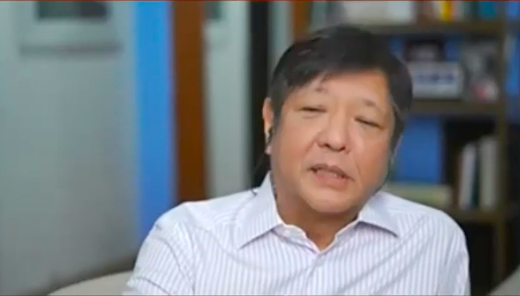MANILA, Philippines — Ferdinand Marcos Jr. did not feel alluded to when President Rodrigo Duterte said a presidential candidate was using cocaine, but he went ahead and had himself tested for drug use to show he was “against illegal drugs.”
The ex-senator took a cocaine test on Monday and the result was submitted on Tuesday to the Philippine Drug Enforcement Agency ( PDEA), the Philippine National Police, and the National Bureau of Investigation.
A statement he issued on Tuesday did not contain the test result, but he told broadcaster Anthony Taberna, “Of course I’m negative.”
In his statement, the son and namesake of the late dictator Ferdinand Marcos said he did not feel he was the subject of Duterte’s claim that a presidential candidate was a cocaine user and a “weak leader” who had done “nothing.”
“I really don’t feel that I am the one being alluded to. In spite of that, I believe it is my inherent duty as an aspiring public official to assure my fellow Filipinos that I am against illegal drugs,” he said.
Negative for meth
Marcos Jr. tested negative for methamphetamine, the active ingredient of “shabu”; for THC (or delta 9-tetrahydrocannabinol), the primary psychoactive component of marijuana; and for cocaine.
The tests for shabu and marijuana using a urine sample were conducted on Nov. 10 at the PNP Crime Laboratory Office — a requirement for Marcos Jr.’s application for a permit to carry firearms outside his residence.
The test for cocaine was conducted on Nov. 22 at St. Luke’s Medical Center in Taguig City.
“Let me reiterate my assurance to my fellowmen, especially to the supporters of BBM-Sara Uniteam, that I am, and will remain, a vigilant anti-illegal drugs campaigner,” Marcos Jr. said, referring to his election pairing with the president’s daughter, Davao City Mayor Sara Duterte.
He called on other national candidates to get tested, “to assure our people, particularly the young generation, that no elected leader is into illegal substances.”
On Monday, Sen. Panfilo Lacson and Senate President Vicente Sotto III, also presidential and vice presidential candidates, took drug tests and publicly showed their negative results.
The Supreme Court has ruled that it is illegal to require candidates to undergo drug tests as it is not provided for in the 1987 Constitution.
Five days earlier, the president alleged that a male presidential aspirant with a famous father was a “weak leader” and a cocaine user.
Marcos Jr.’s chief of staff Victor Rodriguez said the standard-bearer of the Partido Federal ng Pilipinas did not feel alluded to and that his camp had the “highest respect” for the president.
Days later, the president, himself a senatorial candidate, named Marcos Jr. in a speech as a “weak leader” and a “spoiled child.” Marcos Jr.’s camp has yet to comment on those remarks.
No repository of results
PDEA spokesperson Derrick Carreon confirmed that the agency had received Marcos Jr.’s drug test results.
Carreon clarified, however, that the PDEA was not a repository of results of drug tests conducted by other testing facilities.
He said PDEA labs may administer drug tests upon request by any party and approval by the director-general, as when Lacson and Sotto had themselves tested at the PDEA office in Quezon City.
Both tested negative in the multidrug testing kit, which can check the presence of all types of illegal drugs.
The PNP has yet to comment on Marcos Jr.’s tests and results. Its chief, Gen. Dionardo Carlos, earlier challenged all local and national candidates in the 2022 elections to submit to drug testing even if it was not among the requirements set by law.
Carlos said that by doing so, candidates would set a good example to their fellow Filipinos.
He said he had tasked the PNP’s Drug Enforcement Group to look into Duterte’s claim that a presidential candidate was using cocaine.
Voluntary act
In Malacañang, acting presidential spokesperson Karlo Nograles said candidates who wanted to prove they were not who Mr. Duterte had described as hooked on cocaine were free to have themselves tested and disclose the results to the public.
“This is really a purely voluntary act for any candidate in whatsoever position. it’s really up to them…,” he said in his press briefing, pointing out that getting tested for drugs was not among the requirements for candidacy.
Asked if the president’s information on the cocaine-using candidate was current or old and if he had direct knowledge about it, Nograles said Malacañang was leaving it to the police fact-finding investigation to determine the candidate’s identity and take the appropriate action.
In a speech in General Santos City on Monday, Duterte used the past tense in referring to the cocaine user.
In the second of two speeches in Oriental Mindoro last Friday, the president said he could not name the candidate because he had not seen the candidate in the act. He hinted that he knew about it when he was still mayor of Davao City.
Rich people knew
Duterte has also said that “rich people” apparently acquainted with the candidate knew about his cocaine habit, and that the drug use took place in a yacht or airplane.
Asked for comment, Nograles said the police were not without means to catch drug users even in yachts in international waters or in airplanes outside the Philippine jurisdiction.
He said the government could reach out to international partners to enforce laws against illegal drugs.
